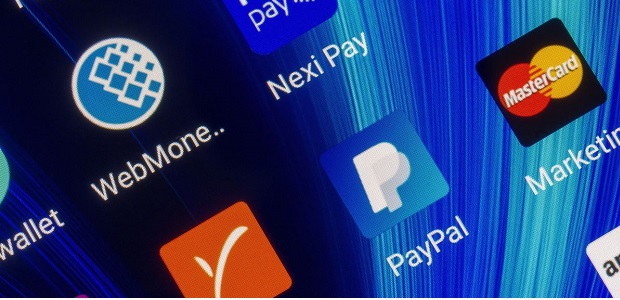
The financial industry calls it “the Nascar effect” – that mess of payment logos spread across a retailer’s online checkout page like the side of a race car. Often there are buttons for every major credit card, PayPal and a growing universe of services from tech giants such as Google. But what if several big players teamed up and offered one button that would work for the vast majority of consumers? Might other icons start to peel away?
Earlier this week Visa Inc. and Mastercard Inc., the world’s largest card networks, told an industry conference they will combine their Visa Checkout and Masterpass payment options into a single button. Spokesmen for American Express Co. and Discover Financial Services said their firms also will join the project.
The aim, according to the card networks, is to make online shopping simple, letting people finish with a few clicks – an experience pioneered by PayPal Holdings Inc. Yet some analysts say the coordinated effort may ratchet up competition between cards and PayPal, something long seen as a potential risk to that company’s meteoric growth.
The button is still being developed. Mastercard and Visa won’t start moving consumers enrolled in Visa Checkout and Masterpass to the new program until later this year.
Since launching Masterpass and Visa Checkout in 2012 and 2014, respectively, the systems have struggled to match PayPal’s popularity. The company is widely considered the U.S. leader in digital wallets. About 58 percent of merchants surveyed last year said they already accept PayPal with more saying they plan to do so this year, according to a study that was partially funded by PayPal. Visa Checkout and Masterpass were accepted by 26 percent and 16 percent of the merchants, respectively.
Visa and Mastercard haven’t yet had pricing discussions with retailers. Nor is there currently a plan to shift liability to encourage retailers to adopt the unified button, according to senior payment executives TS Anil at Visa and Jess Turner at Mastercard. When the card networks jointly rolled out chip cards in the U.S., they coaxed retailers to participate by forcing them to bear the cost of fraud until they updated their terminals.
The networks also said they hope to work with the World Wide Web Consortium, a standard-setting body for Internet browsers. Last year, the consortium called on all browser makers to help merchants streamline checkout pages by letting customers reuse previously stored payment information, a move that could crimp PayPal’s business offering merchants one-touch checkout.
The new system will rely on Visa and Mastercard’s token technology, which enhances online security by replacing some cardholder information with a digital ID. That may help retailers such as Netflix Inc. that keep credit cards on file for recurring payments because it automatically updates when customers replace cards.
The card companies are still picking a name for their button. And “what that button will look like has not been decided yet,” Turner said.
Source: Bloomberg
Banking 4.0 – „how was the experience for you”
„To be honest I think that Sinaia, your conference, is much better then Davos.”
Many more interesting quotes in the video below: